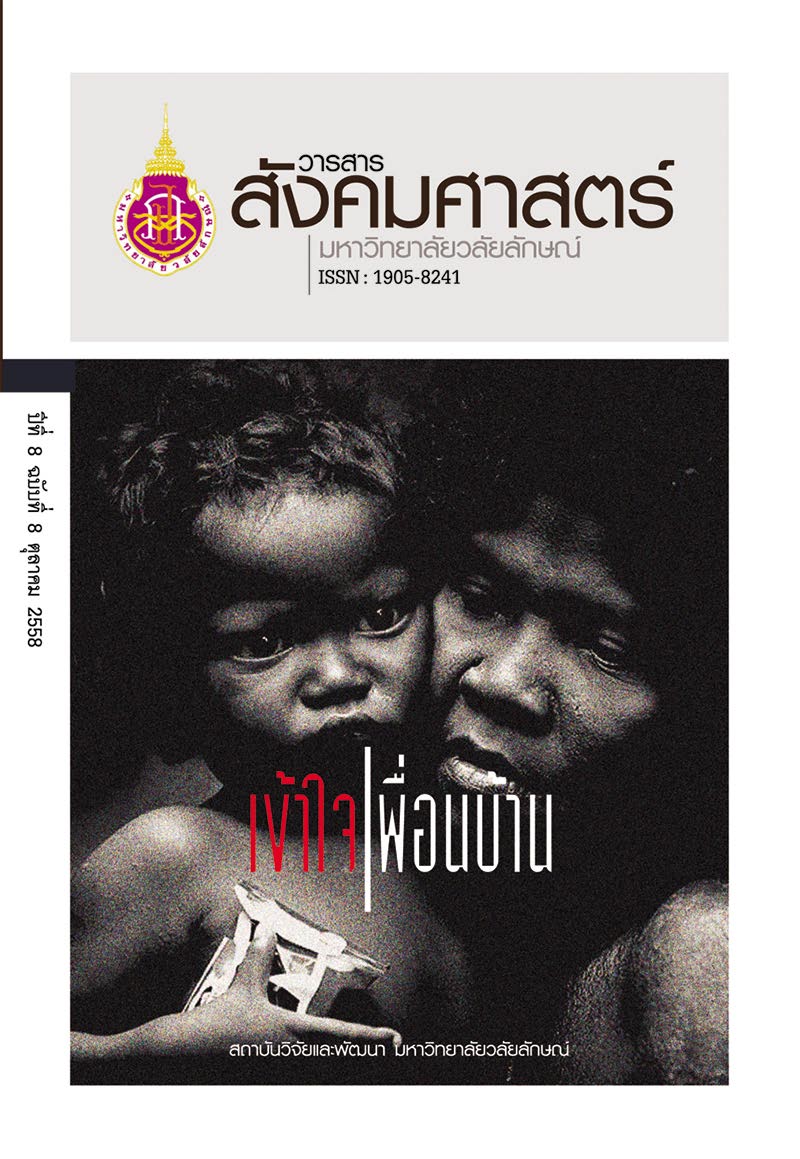Sir Syed Ahmad Khan(1817-1898):Transition of violence to education system (in Thai)
Main Article Content
Abstract
The article is not only to analyse, but to explore an experience about the social reform of Sir Syed Ahmad Khan (1817-1898) after the violence of Indian revolution in 1857 which was against British rule. The period which is a transition from the violence and a step forward to the educational reform. For the reason, the Muslims in India who were not only seeking a good model for their life, but they also, were searching for a new identity within the violent and unrest situation for the future
The study found that Sir Syed Ahmad Khan transformed the violence of the bloodshed into a new idea under the educational model. He used the concept of “Qaum” in order to make cooperation between Muslims and Hindus who were not only belonged to the group of conflict, but they were the citizens of India. He, however, converted their belief under old form of violence to the education system. He also, was running the small group of people to study the social phenomenon and created the intellectual institution for Indian people. The contribution of Sir Syed in the field of education later on comes out with the result of the Aligarh Movement, which was initiated by him as a reformist. It is beyond doubt that education has been the need of any society. Education is a life long process and the development of any country depends upon its standard and quality in the country. Currently, The Aligarh Muslim University is the strong seed and good production which has grown up from that reform. Because of his believes that the violence, however, which is not the strongest power for using to change the world, except education system.
เซอร์ ซัยยิด อะหมัด คาน: ปลดแอกความรุนแรงสู่การศึกษา
บทความชิ้นนี้มีจุดมุ่งหมายเพื่อศึกษาวิเคราะห์ถึงแนวคิดของเซอร์ ซัยยิด อะหมัด คาน และการถอดบทเรียนในการทำงานเพื่อขับเคลื่อนสังคมหลังการปะทะครั้งยิ่งใหญ่ของกองทัพปลดแอกประชาชนชาวอินเดียกับอาณานิคมอังกฤษในปี อีกด้วย ห้วงยามดังกล่าวนับเป็นช่วงหัวเลี้ยวหัวต่อในการทำงานและถือเป็นความยากยิ่งในการนำพามวลชนออกจากสถานการณ์ความขัดแย้งเพื่อไปสู่ทางรอดเดียวในขณะนั้นคือ ระบบการศึกษา ด้วยเหตุนี้มุสลิมในประเทศอินเดียไม่เพียงแค่แสวงหาแนวทางการดำรงชีวิตของพวกเขาภายใต้บริบทแห่งความรุนแรงและสถานการณ์แห่งความไม่สงบกระนั้นพวกเขายังต้องการค้นหาอัตลักษณ์แบบใหม่ให้กับสังคมเพื่อปรับใช้ในอนาคตอีกด้วย
จากการศึกษาพบว่า เซอร์ ซัยยิด อะหมัด คานได้เปลี่ยนผ่านวัฒนธรรมแห่งความรุนแรงที่มุ่งเน้นการนองเลือดไปสู่สังคมใต้ขนบใหม่ ๆ ด้วยการศึกษา ท่านพยายามสร้างแนวคิดในการปลดปล่อยตัวเองจากจักรวรรดินิยมอังกฤษด้วยการปลุกพลังบวกของความรักระหว่างประชาชนชาวมุสลิมและฮินดูที่เคยมีปมขัดแย้งระหว่างกันผ่านสำนึกสาธารณะของความเป็นพี่น้องร่วมแผ่นดินผู้มีส่วนร่วมในชะตากรรมแห่งความเป็นพลเมืองอินเดียใต้นิยามคำว่า “Qaum” (Nation) อย่างไรก็ตามท่านได้เปลี่ยนแนวคิดทางการต่อสู้จากการใช้ปากกระบอกปืนไปสู่ปลายปากกาใต้แนวคิดการศึกษา ท่านได้สร้างกลุ่มคนเล็ก ๆ ที่มุ่งเน้นศึกษาความเป็นไปของสังคมและถอดบทเรียนเพื่อหาทางออกร่วมกันด้วยการก่อตั้งสถาบันทางปัญญาให้กับสังคมอินเดีย ผลของการขับเคลื่อนดังกล่าวปรากฏขึ้นในนามกลุ่มเคลื่อนไหว อาลิการ์ ปัจจุบันมหาวิทยาลัยมุสลิมอาลิการ์ได้กลายเป็นเมล็ดพันธุ์ที่ทรงพลังและเป็นปฏิมากรรมชิ้นเอกของ ซัยยิด อะหมัด คาน เพราะท่านเชื่อว่า การศึกษาเท่านั้นที่เป็นอาวุธทางปัญญาซึ่งมีพลังมากพอในการเปลี่ยนผู้คนทั้งโลก หาใช่ปลายกระบอกปืนและการหยิบยื่นของกำนัลให้แก่กันด้วยหยดเลือดและความรุนแรงArticle Details
Copyright: CC BY-NC-ND 4.0


